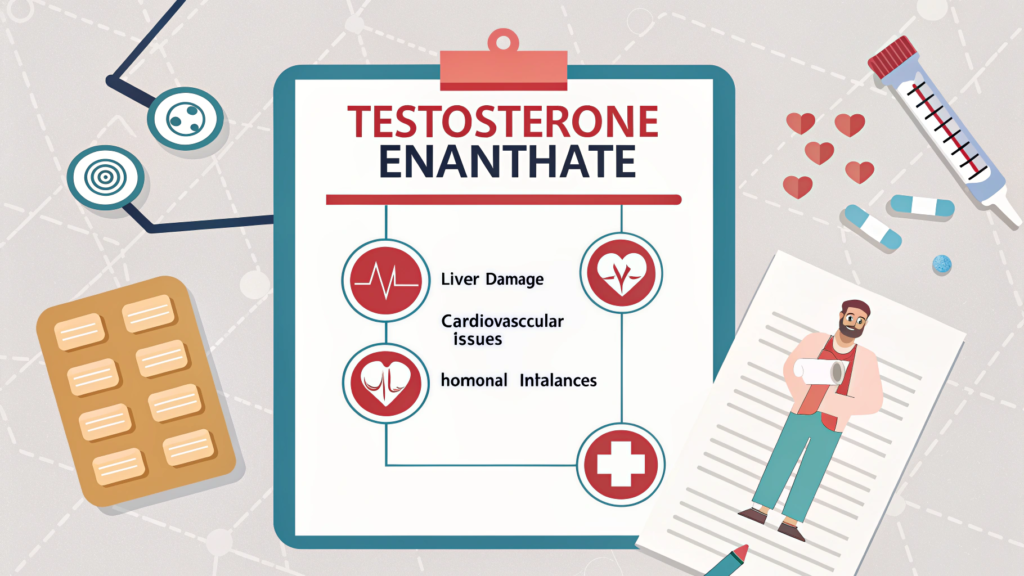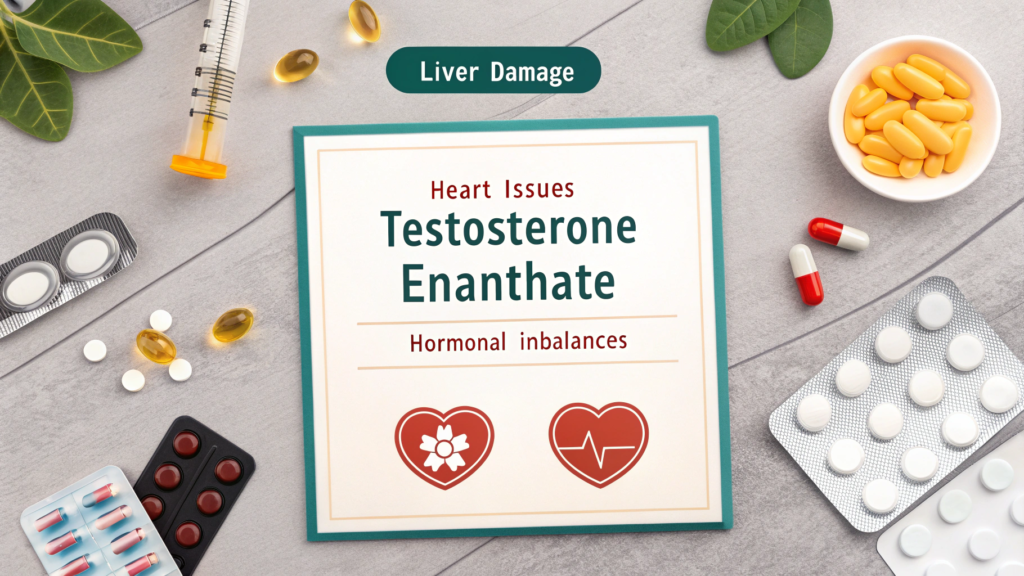Steroids, including testosterone enanthate, are sometimes used in medical settings to treat conditions like low testosterone levels, delayed puberty, or certain forms of breast cancer. However, some individuals misuse steroids in an attempt to enhance physical performance, increase muscle mass, or improve their appearance. While steroids like testosterone enanthate can deliver noticeable short-term benefits, taking excessive amounts can lead to serious and often irreversible consequences.
In this article, we’ll explore the potential risks and health complications associated with the misuse of testosterone enanthate and similar anabolic steroids.
What is Testosterone Enanthate?
Testosterone enanthate is a synthetic form of testosterone, a hormone naturally produced by the body that plays a crucial role in male health, including muscle growth, libido, bone density, and overall vitality. As an anabolic steroid, testosterone enanthate has both muscle-building (anabolic) and performance-enhancing (androgenic) effects. In clinical settings, it’s used to treat testosterone deficiencies, but when abused, it can lead to a wide range of adverse health effects.

Short-Term Effects of Excessive Steroid Use
When taken in excessive amounts, testosterone enanthate can produce a range of immediate physical and psychological changes. These include:
1.Increased Aggression: One of the most commonly reported psychological side effects of anabolic steroid abuse is “roid rage,” a state of heightened aggression, irritability, and even violent behavior. This occurs as testosterone influences mood-regulating areas in the brain. According to a 2019 study published in Psychiatry Research, approximately 10-20% of individuals who misuse anabolic steroids report experiencing extreme mood swings, including aggression and irritability.
Dr. Norman P. Alessi, a psychiatrist, explains, “Steroids can significantly alter mood and behavior. The emotional volatility associated with steroid abuse is well-documented and can lead to aggressive outbursts or violent behavior.”
2. Fluid Retention and Weight Gain: Excessive testosterone can cause the body to retain water, leading to bloating, puffiness, and rapid weight gain. This can alter an individual’s appearance and cause discomfort. In one study of athletes using testosterone supplements, 63% reported noticeable fluid retention, which contributed to temporary weight gain and discomfort.
Dr. Jennifer L. Smith, a physician who specializes in endocrinology, notes, “Fluid retention is a common side effect of steroid misuse. It can create a distorted sense of progress, as the visible increase in size is not muscle but water weight.”
3. Acne and Oily Skin: Increased levels of testosterone stimulate the sebaceous glands in the skin, leading to excess oil production, clogged pores, and acne outbreaks—especially on the back, shoulders, and face. A 2018 study in Dermatology Reports found that 70% of men who abuse anabolic steroids experience acne as a direct result of hormonal changes.
Dr. Carol F. Sutherland, a dermatologist, states, “The excessive oil production triggered by anabolic steroids can lead to severe acne, particularly on areas like the face, chest, and back. For some, this can be a lasting and damaging side effect.”
4. Sleep Disturbances: High doses of testosterone can interfere with sleep patterns, causing insomnia or poor-quality sleep, which in turn can affect mood and overall well-being. According to a 2020 review published in Sleep Medicine Reviews, approximately 30-40% of steroid users report experiencing sleep disruptions such as insomnia or difficulty maintaining deep sleep.
Dr. Emily Roberts, a sleep specialist, explains, “Testosterone abuse can disrupt circadian rhythms and lead to insomnia. This deprives the body of essential recovery time, which can affect mental clarity and general health.
Long-Term Consequences of Steroid Abuse
The long-term misuse of testosterone enanthate can have far-reaching and potentially irreversible effects on multiple organ systems. Some of the most concerning health risks include:
1. Cardiovascular Damage
Excessive testosterone can negatively impact cardiovascular health, raising the risk of heart disease. Studies have shown that long-term use of anabolic steroids can lead to:
Increased LDL (bad cholesterol) and decreased HDL (good cholesterol): This imbalance increases the risk of plaque buildup in arteries, leading to atherosclerosis and potentially heart attacks or strokes.
High Blood Pressure: Elevated testosterone levels can lead to increased blood pressure, putting additional strain on the heart and kidneys.
Blood Clotting Issues: Steroids can increase the thickness of the blood, raising the risk of blood clots, which can lead to dangerous conditions like deep vein thrombosis (DVT) or pulmonary embolism.
According to a 2017 study in the Journal of the American College of Cardiology, steroid abuse increases the risk of cardiovascular diseases by 30-40% among chronic users, significantly raising the chances of heart attacks, strokes, and other heart-related conditions.
Dr. William R. Hazzard, a cardiologist, warns, “Steroid abuse can be a significant risk factor for heart disease. It can alter cholesterol profiles and raise blood pressure, both of which contribute to long-term cardiovascular problems.”
2. Liver Damage
Like other anabolic steroids, testosterone enanthate is processed through the liver. Chronic use, especially in high doses, can overwhelm the liver and lead to:
Liver toxicity: The liver may become damaged, potentially leading to jaundice, liver cysts, or even liver failure in extreme cases.
Liver Cancer: Long-term steroid abuse can increase the risk of developing liver tumors, some of which may be cancerous.
A report from the National Institute on Drug Abuse (2020) highlighted that 15-20% of steroid users develop liver issues such as liver enzyme abnormalities, jaundice, or fatty liver.
Dr. Gary G. McDonald, a liver specialist, cautions, “The liver is incredibly resilient, but it has its limits. Chronic steroid abuse can push the liver to the point of failure, and that can lead to long-term, often irreversible damage.”
3. Hormonal Imbalance and Endocrine Disruption
Testosterone enanthate can disrupt the body’s natural hormone production. High external testosterone levels signal the body to reduce its own production of the hormone, leading to:
Testicular Shrinkage: The testes may shrink due to suppressed natural testosterone production, leading to reduced sperm production and possible infertility.
Gynecomastia: An increase in estrogen levels, a byproduct of excess testosterone conversion, can lead to the development of breast tissue in men, a condition known as gynecomastia.
Reduced Libido and Erectile Dysfunction: Paradoxically, while testosterone initially boosts libido, long-term excessive use can lead to sexual dysfunction, including erectile dysfunction and a reduced sex drive, once the body’s natural testosterone production is impaired.
Dr. Jeffrey M. Blevins, a urologist, explains, “While testosterone enanthate may improve sexual drive in the short term, long-term misuse can suppress natural hormone production, leading to issues like erectile dysfunction and reduced libido. In many cases, these effects may be permanent.”
4. Mental Health Issues
Steroid use, especially in high doses, can have serious psychological consequences, including:
Mood Swings: Individuals may experience extreme highs and lows, leading to irritability, anxiety, and depression.
Aggression and Violence: Known colloquially as “roid rage,” this heightened aggression can lead to violent behavior, interpersonal conflicts, and even legal troubles.
Psychiatric Disorders: Long-term steroid abuse is associated with an increased risk of mood disorders, such as depression and anxiety, particularly when individuals stop using the drug and experience withdrawal symptoms.
According to a study published in The Journal of Clinical Psychiatry, 23-30% of anabolic steroid users report significant mood disturbances, ranging from anxiety and depression to full-blown psychiatric episodes such as paranoia or aggression.
Dr. Jerome L. O’Toole, a psychiatrist who has studied the psychiatric effects of steroids, states, “Steroids can exacerbate underlying mental health conditions and create new psychological problems, such as aggression, paranoia, and even suicidal thoughts.”
5. Musculoskeletal Problems
While anabolic steroids like testosterone enanthate promote muscle growth, excessive use can lead to skeletal issues, such as:
Joint and Tendon Damage: As muscles grow rapidly under the influence of steroids, tendons and joints may not keep up, increasing the risk of strains and injuries.
Premature Closure of Growth Plates: In adolescents or young adults, excessive testosterone can prematurely close the growth plates in bones, resulting in stunted growth.
Dr. Robert M. Malina, an expert in sports medicine, explains, “Steroids can cause muscles to grow faster than bones and tendons, leading to an increased risk of injury. In younger users, this can also stunt growth if the growth plates close prematurely.”
Reproductive Health Risks
Excessive testosterone use can have significant effects on reproductive health, including:
Decreased Sperm Count and Infertility: Testosterone abuse can suppress sperm production, making it difficult or impossible for some men to father children.
Sexual Dysfunction: Over time, excessive testosterone can lead to a loss of libido and erectile dysfunction, even though it might initially boost sexual desire.
Dr. John M. Williams, an endocrinologist, cautions, “Excessive use of testosterone can severely impact fertility. It often leads to reduced sperm count, and in some cases, permanent infertility.”
Conclusion: Why Caution is Crucial
While testosterone enanthate and other steroids can offer short-term benefits, the long-term consequences of misuse far outweigh any temporary gains. From cardiovascular risks to hormonal disruptions, liver damage, and mental health issues, the potential dangers are significant. It’s important to remember that while steroids may seem like a shortcut to improved performance or appearance, the risks they pose to overall health and well-being are severe.
If you’re considering testosterone therapy, it is crucial to do so under the supervision of a healthcare professional. They can help ensure that any treatment is medically necessary, properly dosed, and monitored for safety.
Ultimately, achieving long-term health and fitness should focus on balanced nutrition, regular exercise, and a lifestyle that supports natural hormone balance, rather than resorting to excessive steroid use.o





